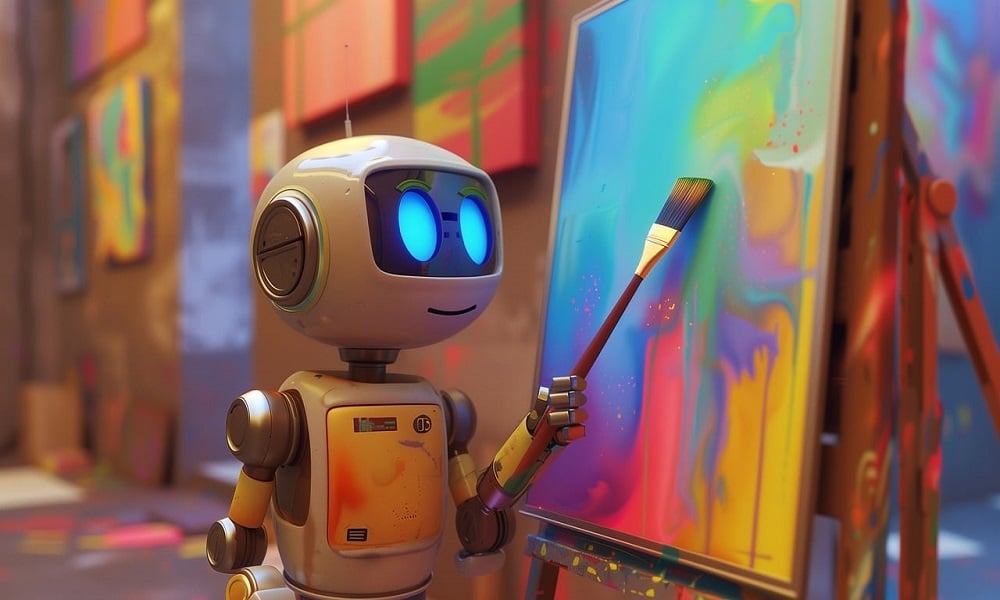Artificial intelligence (AI) stands at the forefront of transforming custom art-centered businesses. AI technologies are revolutionizing how artists conceptualize, create, and interact with clients, creating a new era of innovation and efficiency.
As AI continues to evolve, its role in artistry expands, promising to unlock new levels of creativity and client engagement that were previously unattainable. This article explores how AI is reshaping every aspect of custom art-centered businesses, offering insights into the benefits, challenges, and ethical considerations that accompany this transformative technology.
AI’s Role in Improving Tattoo Design
AI-generated images based off the prompt “an amazing tattoo of a bird”
Let’s discuss how AI technologies have revolutionized the creation process. It offers unmatched efficiency and creativity. By leveraging advanced algorithms, AI streamlines the traditionally time-consuming task of creating custom art. These algorithms can analyze various artistic styles, cultural motifs, and standard client preferences to generate designs that will resonate.
For example, AI serves tattoo artists as a powerful tool to enhance productivity without compromising integrity. Artists can now explore a wide variety of design variations within minutes, refining and customizing elements until achieving the perfect composition.
AI applications in tattoo artistry extend beyond design generation to personalized customization. For example, AI-driven platforms can analyze client input regarding preferred themes and colors to suggest design modifications that optimize visual impact and longevity. This level of personalization ensures that each tattoo is not only aesthetically pleasing but also tailored to the individual.
Enhancing Social Media Presence and Client Engagement

Social media plays a pivotal role in the success of artists by providing a platform to showcase their artistry and attract new clientele. AI tools have emerged as irreplaceable allies in optimizing social media content to maximize engagement and reach.
In the example of our tattoo artist, AI-powered algorithms can analyze tattoo images and generate compelling captions and relevant hashtags. These captions not only describe the artwork but also incorporate trending keywords and phrases that enhance visibility in search results.
Additionally, AI helps artists tailor their content strategies based on analytics, identifying peak posting times and preferred content formats among their followers. By leveraging these insights, artists can strategically amplify their online presence, ensuring that each post resonates with their target audience.
Beyond content creation, AI facilitates interactive client engagement through innovative tools like chatbots. These bots are designed to handle routine inquiries, schedule appointments, and provide personalized responses to client questions. For example, a potential client interested in a particular tattoo design can interact with a chatbot to gather detailed information about the artist’s portfolio, pricing, and availability.
Streamlining Client Communications and Service

In artistry, effective client communication is essential for ensuring personalized service and satisfaction. AI technologies offer valuable solutions by automating various aspects of client interaction.
Also, AI algorithms can analyze client feedback and preferences gathered from interactions, enabling artists to refine their designs according to individual tastes and expectations. This iterative process not only enhances the efficiency of design revisions but also fosters a collaborative environment where clients feel actively involved in the creative process.
Beyond automation, AI enhances customer service by offering personalized advice and information tailored to clients’ specific needs. In our tattoo example, AI-powered platforms can provide detailed guidance on maintenance or aftercare, ensuring clients receive the proper instructions.
AI Tools for Artistic Collaboration and Innovation

AI technologies are revolutionizing artistic collaboration by facilitating seamless communication and idea-sharing among artists. Platforms like Adobe Creative Cloud with AI integrations enable artists to collaborate remotely on intricate designs. Artists can share sketches, receive real-time feedback, and co-create designs with colleagues or clients.
AI-powered design tools also inspire artists to explore new creative horizons by offering innovative features such as style transfer and predictive design suggestions.
Additionally, AI algorithms learn from artists’ preferences and previous designs, providing personalized recommendations that spark fresh ideas and refine techniques. This process allows artists to evolve their signature styles while staying relevant in an ever-changing industry.
Addressing Challenges and Ethical Considerations

As artificial intelligence (AI) becomes increasingly integrated into the artistry landscape, discussions around the authenticity and originality of AI-generated designs have sparked debates within the industry. AI tools offer artists efficient ways to create intricate and personalized designs, but questions arise regarding the uniqueness of these designs.
Critics argue that AI-generated artwork may lack the soul and personal touch that traditionally handcrafted art embodies. However, proponents suggest that AI can complement artistic creativity by offering innovative design elements and enhancing precision.
For example, ethical considerations in AI-assisted tattoo design revolve around cultural appropriation and respecting clients’ cultural identities. Tattoo artists using AI must navigate the sensitive terrain of cultural symbols and motifs to avoid unintentionally appropriating cultural heritage. Responsible AI use entails understanding the historical and cultural significance of tattoo designs and consulting with clients to ensure designs align with their values.
Transparency in AI usage is crucial. Artists should disclose when AI tools contribute to the design process, maintaining open communication about how technology enhances but does not replace artistic intuition.
Conclusion

AI-generated image
Artificial intelligence (AI) has emerged as a powerful ally in the realm of artistry, revolutionizing how artists create, collaborate, and connect with clients.
By harnessing AI-driven tools, artists can streamline design processes, offer personalized artwork, and expand their reach through enhanced social media engagement.


